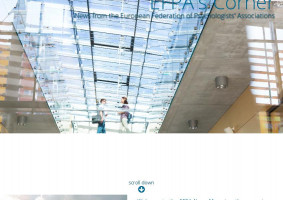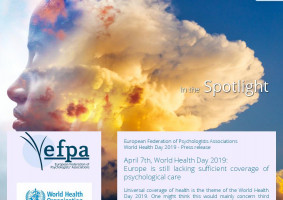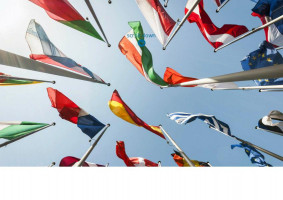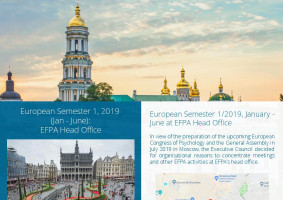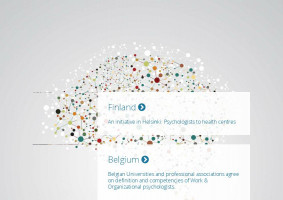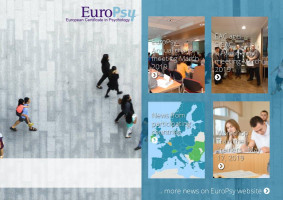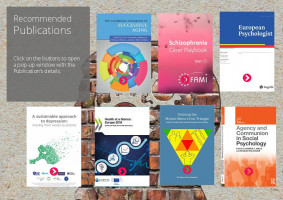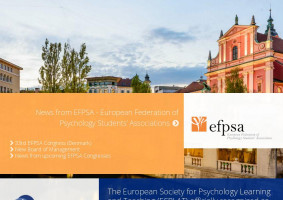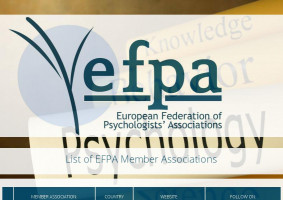Welcome to the EFPA News Magazine, the magazine that was established for the exchange of all relevant news and information among our member associations.
As spring is in the air, the European Conference of Psychology is getting closer. Preparations are in full swing at EFPA's Head Office. We are delighted to open this edition with a special announcement about the opening ceremony of the ECP on July 2 in Moscow.
Furthermore, together with the World Health Organisation we look back on this years' World Health Day of April 7th. In May, EuroPsy will be organising a workshop 'Train the trainers'. And as always, we provide a variety of announcements from our Member Associations and Associate Member associations.
Enjoy the May edition of the EFPA News Magazine!
The editorial board.
news@efpa.eu
Follow us on

Opening Ceremony of ECP 2019 in Kremlin Palace
Dear ECP2019 participants!
We are delighted to announce that the ECP 2019 Opening Ceremony will be held at The State Kremlin Palace in the heart of Moscow on July 2, from 19:00 – 21:00.
Learn more

ECP 2019 Summer School
We are happy to announce that due to numerous requests the deadline for ECP 2019 Summer School application has been prolonged!
The Russian Psychological Society and the Faculty of Psychology of Lomonosov Moscow State University are pleased to announce the ECP 2019 Summer School, which will be held at the Lomonosov Mosсоw State University in Moscow, from June 30 till July 1, 2019.
We invite under- and postgraduate students and young researchers to a two-day Summer School on the topic “Research in human development”.
To participate in ECP 2019 Summer School one should be a registered participant of the ECP2019.
To apply for the ECP 2019 Summer School you should send a research essay in English language up to 1000 words and attach a CV.
Participation in ECP Summer School is free of charge.
_w748_h532_1.png)
EFPA Standing Committee on Community Psychology:
Meeting organized together with the Community Psychology Conference in Bratislava, December 2018.
Bratislava is the youngest capital of Europe, and should be listened to carefully for this reason. After the Soviet Union split up, Slovakia was separated from the Czech Republic.
This beautiful old city has a long history of mining industry and transport technology. The University is spread all over town, and this year's conference on Community Psychology was hosted by the Institute of Applied Psychology at the Comenius University, together with the European Community Psychology Association (ECPA) and the Society for Community and Action Research (SCRA). >>
_w766_h384_1.jpg)
The program lasted two days including a work shop on "Theatre of the oppressed" and "Joint projecting".
Among participants were many students from the local University, who also presented their research projects for feedback from International acclamed academics in the field.
All presentations were plenary, to increase participation. The vast range of topics included:
- artificial Intelligence and re-training,
- empowering laboratory,
- social media as drivers of political extremes,
- self help groups and lectures online,
- how to build a passionate community,
- multi dimentional profiling,
- tacit knowledge,
- lack of housing as risk for long term homelessness,
- the use of art and music in discovering the sound of a Community,
- story telling as rehabilitation and treatment of drug addiction,
- the path to integration without changing the context,
- climate justice at community level
- ... and many more.
EFPA and ECPA were invited back next year, and we are looking forward to collaborate more with eastern Europe in the future. The proceedings from this conference have been published in the Journal of Human Affairs.
Nicholas Carr,
EFPA Convenor Standing Committee on Community Psychology.
Higher Education in Community Psychology in Europe.
A review by EFPA Standing Committee on Community Psychology.
In our ongoing survey we found that probably 68% of European countries have not included community psychology in their general psychology education.
On the other hand, community psychology is a regular part of the educational system in 32% of European countries.
In 2018, the Standing Committee on Community Psychology (SC-CP) contacted universities in European countries which are teaching community psychology at different educational levels.
The review is based on the answers from fourteen National Psychological Associations. The review data show that CPS is systematically taught in a variety of psychology disciplines in at least 35 universities in countries (Finland, Germany, Italy, Malta, Netherlands, Norway, Poland, Portugal, Slovenia, Spain, Turkey, United Kingdom).
Community psychology is mentioned in social psychology, health psychology, environmental psychology, educational psychology, applied psychology, cultural psychology and clinical psychology.
At the BSc-level two universities in Portugal and the United Kingdom offer specialized community psychology studies. In 20 European universities (Italy, Portugal, Spain, United Kingdom) community psychology studies are organized at the MSc-level.
In addition, community psychology Ph.D. programs are part of the educational program in 16 universities. Community psychology is offered as a subject without specific qualification, at ten universities in Italy, Portugal, Spain, and United Kingdom. One university offers a specialized orientation in developing communities (Portugal), one university integrated community psychology in organizational psychology (Spain), one university is community psychology and school oriented, and one has an explicit critical orientation emphasizing human rights (United Kingdom). Four European universities in Spain and United Kingdom are including community psychology as part of Applied Social Psychology. More clinically oriented are two universities in Italy and United Kingdom.
The overarching goal of community psychology education is a combination of qualitative and quantitative methods.
Community psychology theories are building on concepts such as salutogenesis, ecological models; empowerment, well-being, sense of community, human rights, social network and social change.
Common research interests are shared between the universities, and some teachers are regular invited guest lecturers to other Universities.
Comprehensive core competences and key elements in community psychology were not sufficiently reported to be included in the review by different universities.
As part of its work plan, the Standing Committee on Community Psychology is developing a primer of basic community psychology competences to be included in programs like EuroPsy.
Prof. Dr. Bernd Röhrle,
Member of the Standing Committee on Community Psychology.
_w1130_h748_1.jpg)
EFPA’s Standing Committee on Geropsychology - annual meeting in Brussels.
On March 15, 2019, EFPA’s Standing Committee on Geropsychology had its annual meeting at the EFPA Head Office in Brussels, Belgium (see picture).
In an increasingly “graying” Europe the Committee works to promote old age psychology (Geropsychology) and facilitate European collaboration between geropsychological clinicians and researchers.
Amongst many important points on the agenda was the upcoming two-part Symposium on “Geropsychology contributions to contemporary ageing issues” at the European Congress of Psychology in Moscow July 2-5, 2019.
The first part of the symposium will deal with “New issues and innovative practices in geropsychology” while the second part will be about “Cognitive functioning, ageing, and mental health”.
Whether or not you consider yourself a geropsychologist, both as a clinician and as a researcher your future professional life will be affected by the ongoing demographic change. >>
_w766_h526_1.jpg)
>> So why not join us at the European Congress of Psychology this summer to get to know more about Geropsychology, meet leading researchers and clinicians and become better prepared for the future.
And remember: Grey is the new black!
For more information, visit the website
Lars Larsen,
Member of the Standing Committee on Geropsychology
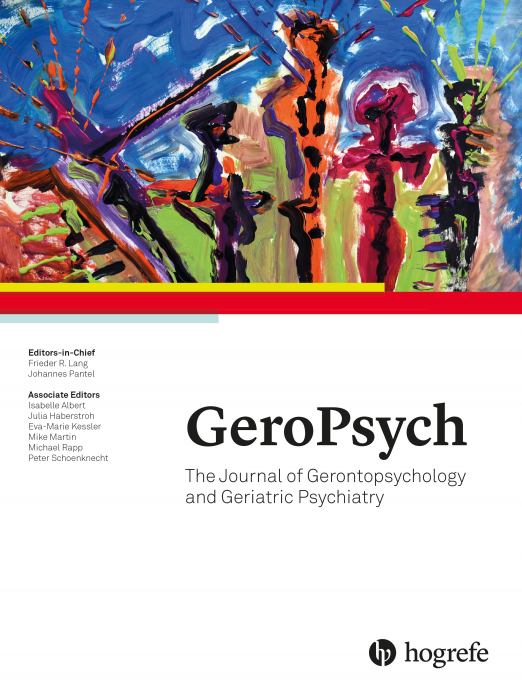
Call for Papers:
Special issue on "Ageing and Culture"
We are announcing a special issue on "Ageing and Culture" to be published in early 2020. We expect original manuscript submissions that evidence high quality, innovative work on cultural aspects of ageing incorporating approaches from the behavioural and social sciences such as (cross-)cultural psychology, developmental lifespan psychology, medical anthropology and ethnology, social gerontology as well as interdisciplinary contributions.
We invite authors to submit original research reports, review articles, as well as conceptual papers that advance scientific understanding of cultural aspects of ageing. See pop-up window for more information.
More information
can be found here
EFPA Board Human Rights & Psychology presents:
Newsletter
Human Rights & Psychology
The monthly Newsletter - this edition of March 2019 - of the EFPA Board Human Rights and Psychology, has news and articles dedicated to the Holocaust Memorial Day of January 27.
On April 2-3, 2019 our Norwegian colleague Kerstin Söderström attended the 12th European Forum on the Rights of the Child in Brussels.
We started to collect articles related to Environment and Human Rights and announcements of forthcoming conferences can be found.
_w766_h398_1.jpg)
Content of newsletter Vol. 3/3 - March 2019:
- EFPA Board Human Rights and Psychology
- FRA - European Union Agency for Fundamental Rights
- FRP - Fundamental Rights Platform
- Children
- Europe, EIUC, CoE, CPT, IOM, ENS, ECCHR
- Environment
- UN News/ global news (poverty)
- Education-articles-press
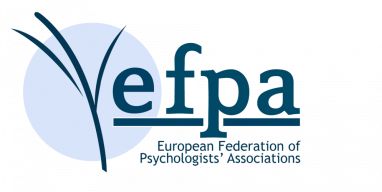
_w1700_h856_1.jpg)

